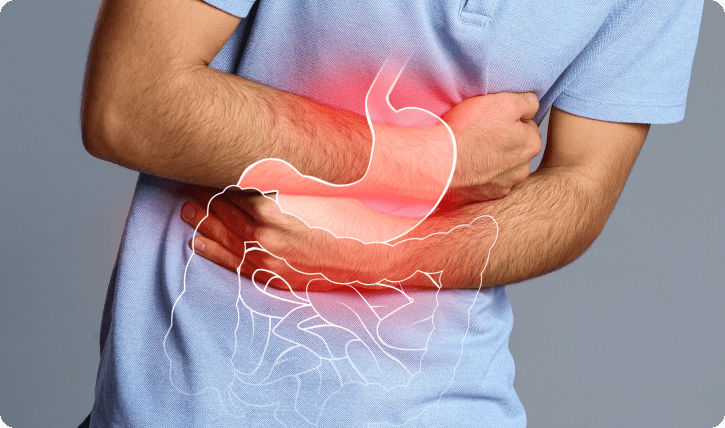Upper Gastrointestinal Conditions
Upper gastrointestinal conditions affect the oesophagus, stomach, and the first part of the small intestine (duodenum).
Gastroesophageal Reflux Disease (GERD)
GERD is a chronic condition where stomach acid frequently flows back into the oesophagus, causing irritation and discomfort. Common signs include frequent heartburn, regurgitation of sour liquid, chest pain, and difficulty swallowing.
While occasional acid reflux is common, persistent symptoms may indicate GERD, which can lead to complications such as oesophagitis, oesophagal strictures, precancerous changes known as Barrett's oesophagus, and an increased risk of oesophagal cancer. Early diagnosis and proper treatment are essential to prevent these outcomes.


Oesophagitis
Esophagitis refers to inflammation of the oesophagus, often resulting from persistent acid reflux, infections, or allergic reactions. Symptoms typically include painful or difficult swallowing, chest pain, heartburn, and regurgitation of food.
If left untreated, oesophagitis may cause complications such as oesophagal strictures, bleeding, or Barrett's oesophagus. Identifying and addressing the underlying cause is key to managing and preventing further damage.
Gastritis
Gastritis is the inflammation of the stomach lining, commonly caused by a H. pylori infection, prolonged use of NSAIDs, excessive alcohol consumption, or autoimmune disorders. Symptoms include indigestion, stomach pain, nausea, bloating, loss of appetite, and, in severe cases, vomiting blood or passing black stools.
Without treatment, gastritis can lead to complications such as stomach ulcers, internal bleeding, and an increased risk of stomach cancer. Early intervention and appropriate treatment are crucial for managing symptoms and preventing long-term damage.
Stomach Ulcers
Stomach ulcers are open sores that develop on the stomach lining, often due to H. pylori infection or prolonged use of NSAIDs. Excessive alcohol intake, smoking, and stress may exacerbate the condition. Symptoms commonly include burning stomach pain, nausea, bloating, dark stools, and unexplained weight loss.
If left untreated, stomach ulcers can lead to serious complications such as internal bleeding, stomach wall perforation, and gastric obstruction. Timely medical intervention is essential to promote healing and prevent complications.




